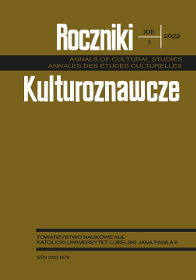Cultural Fact and the Problem of Criteria for its Evaluation
Abstract
The article deals with the problem of the evaluation of cultural facts. The issue is embedded in a philosophical perspective, but the history of philosophy is a history of disputes, the first of which takes place within the tradition of idealism between rationalism and irrationalism, and the second between idealism – its two strands – and the tradition of cognitive realism.
The difference between cultural and culture-forming facts justifies the existence of acts of evaluation, and thanks to the theory of good and the theory of human life, it leads to the conclusion that human life is the measure of evaluation of these acts. It is an absolute good, while living it, we perfect it, we actualize the potentialities it contains, but it confronts us with the necessity of deciding what is its ultimate goal, that is, the goal to which we should strive. This decision influences the nature of our activity, determines the selection of particular goods (useful and pleasurable), the value of which allows us to achieve this goal. It is not a simple and easy task, but this is the drama of our existence in the world.
References
Hazard, Paul. Kryzys świadomości europejskiej 1680-1715. Warszawa: Państwowy Instytut Wydawniczy, 1974.
Hazard, Paul. Myśl europejska w XVIII wieku. Od Monteskiusza do Lessinga. Tłum. Halina Suwała. Warszawa: Państwowy Instytut Wydawniczy, 1972.
James, William. The Will to Believe and Other Essays in Popular Philosophy. New York, London and Bombay: Longmans Green and Co, 1897.
Jaroszyński, Piotr. Człowiek i nauka. Lublin: Polskie Towarzystwo Tomasza z Akwinu, 2008.
Jaroszyński, Piotr. Kultura. Dramat natury i osoby. Lublin: Polskie Towarzystwo Tomasza z Akwinu, 2020.
Jaroszyński, Piotr. Nauka w kulturze. Radom: Polskie Wydawnictwo Encyklopedyczne, 2002.
Kiereś, Henryk. Filozofia sztuki. Lublin: Polskie Towarzystwo Tomasza z Akwinu, 2020.
Kiereś, Henryk. „Idealizm”. W Powszechna encyklopedia filozofii, t. 4, red. Andrzej Maryniarczyk, 721-726. Lublin: Polskie Towarzystwo Tomasza z Akwinu, 2003.
Kiereś, Henryk. „Mit”. W Powszechna encyklopedia filozofii, t. 6, red. Andrzej Maryniarczyk, 279-290. Lublin: Polskie Towarzystwo Tomasza z Akwinu, 2006.
Kiereś, Henryk. Osoba i społeczność. Lublin: Polskie Towarzystwo Tomasza z Akwinu, 2013.
Kiereś, Henryk. „Postmodernizm”. W Powszechna encyklopedia filozofii, t. 8, red. Andrzej Maryniarczyk, 387-391. Lublin: Polskie Towarzystwo Tomasza z Akwinu, 2007.
Kiereś, Henryk. Trzy socjalizmy. Tradycja łacińska wobec modernizmu i postmodernizmu. Lublin: Fundacja Servire Veritati Instytut Edukacji Narodowej, 2015.
Krąpiec, Mieczysław A. „Ab esse ad posse”. W Powszechna encyklopedia filozofii, t. 1, red. Andrzej Maryniarczyk, 14-17. Lublin: Polskie Towarzystwo Tomasza z Akwinu, 2000.
Krąpiec, Mieczysław A. Odzyskać świat realny. Lublin: Redakcja Wydawnictw Katolickiego Uniwersytetu Lubelskiego, 1999.
Krąpiec, Mieczysław A. „Realizm poznawczy”. W Powszechna encyklopedia filozofii, t. 8, red. Andrzej Maryniarczyk, 666-669. Lublin: Polskie Towarzystwo Tomasza z Akwinu, 2007.
Krąpiec, Mieczysław A. Spełniać dobro. Lublin: Fundacja Servire Veritati Instytut Edukacji narodowej, 2000.
Krąpiec, Mieczysław A. U podstaw rozumienia kultury. Lublin: Redakcja Wydawnictw Katolickiego Uniwersytetu Lubelskiego, 1991.
Maryniarczyk Andrzej, i Katarzyna Stępień, red. Błąd antropologiczny (seria: Zadania współczesnej metafizyki, t. 5). Lublin: Polskie Towarzystwo Tomasza z Akwinu, 2003.
Thomae Aquinatis (Sancti). Summa theologiae, cura et studio P. Caramello. Torino: Marietti, 1963.
Skrzydlewski, Paweł. Osoba w przestrzeni publicznej. Wybrane zagadnienia z filozofii człowieka i polityki. Kraków: Wydawnictwo WAM, 2016.
Swieżawski, Stefan. Dzieje filozofii europejskiej XV wieku, t. 6: Człowiek. Warszawa: Akademia Teologii Katolickiej, 1983.





